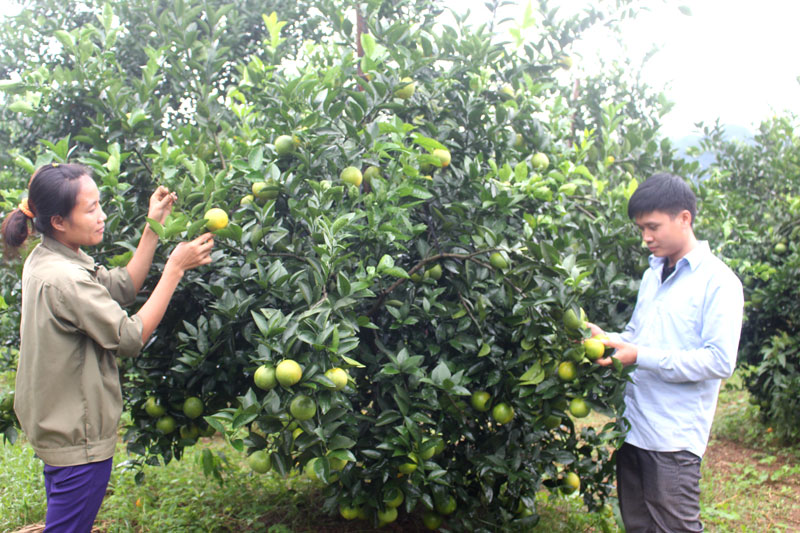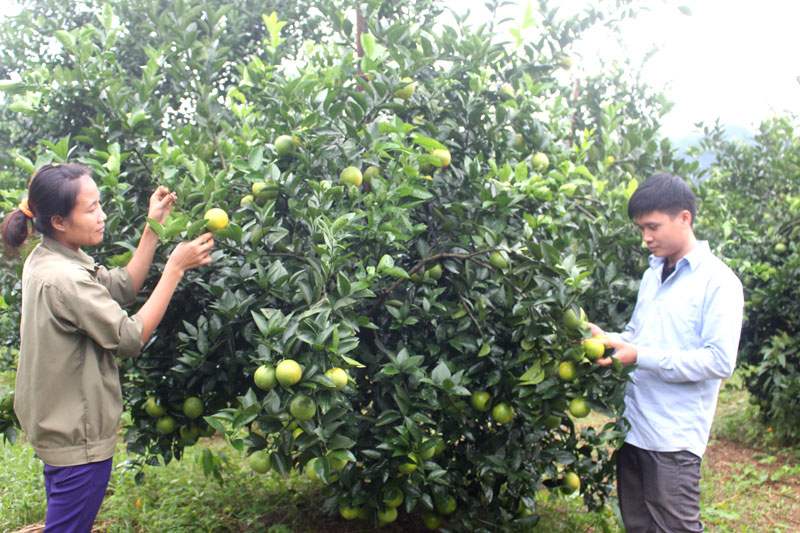
(HBO) – Lac Thuy oranges have just got a collective brand in recognition of efforts by orange farmers in Lac Thuy district after years of maintaining and developing the reputation of the fruits.
Farmers in
Thanh Ha town of Lac Thuy district harvest the 2017-2018 orange crop.
Those who have once tasted oranges grown at
the Thanh Ha Farm in Thanh Ha town, which has long been renowned for its
oranges, or the new orange cultivating area in Lien Hoa commune are all
surprised at the strong sweetness and fragrance of local oranges. Although Lac
Thuy oranges haven’t been strongly promoted in recent years, they are still
sold out as the fruits have been favored by consumers. Many people who used to taste
oranges planted in other regions still praise Lac Thuy oranges as a specialty.
Statistics show that Lac Thuy district is home
to 996ha of citrus fruit trees, including 668ha of oranges, 253ha of grapefruits
and 55ha of lemon trees. About 465ha of orange trees have been planted since
2015, including 213ha cultivated in 2017. The largest orange areas are in Lien
Hoa commune (214ha), Phu Thanh commune (286ha), Thanh Ha town (140ha), Thanh
Nong commune (50ha), and Phu Lao commune (40ha).
More than 30 percent of the total citrus areas
have borne fruit, producing 25-30 tonnes of oranges per ha on average in the
2016-2017 crop. With an average price of 22,000 VND (0.97 USD) per kg, farmers
can earn 550 million VND – 600 million VND (24,200 – 26,400 USD) per ha.
Excluding 150 million VND – 200 million VND (6,600 – 8,800 USD) per ha of production
costs, they gain at least 400 million VND (17,600 USD) per ha in profit.
Hoang Dinh Chinh, deputy head of the district’s
agriculture and rural development division, said local farmers have acquired
good cultivation techniques. All orange farming households have used biological
products and organic fertilizers mixed with powdered lime, thus ensuring food
safety and avoiding polluting the environment. Notably, nylon has been used to
cover fruits of about 30 percent of the orange and grapefruit areas which are
being harvested. As a result, oranges were protected from pests and pesticide,
helping to increase the output by some 20 percent as well as fruit prices.
In late 2016, with a view to promoting the local
orange brand, Lac Thuy district began building a collective brand for Lac Thuy
oranges. It built a recognition system for the product, quality standards, and
a management system for the collective brand. The district has instructed
farmers with cultivation and preservation techniques, registered the collective
brand of Lac Thuy orange, granted certificates of the right to use the
collective brand, and introduced the product to stores of farm produce.
A ceremony to announce the Lac Thuy orange
collective brand was held in mid-November./.
According to data from the Hoa Binh Provincial Party Committee, the industrial production index for the first six months of 2025 is estimated to have increased by 20% compared to the same period last year. This marks the highest year-on-year growth rate for this period since 2020.
In the first six months of 2025, Hoa Binh province’s export turnover was estimated at 1.145 billion USD, marking an 18.11% increase compared to the same period in 2024. Import turnover was estimated at $ 804 million, a 17.15% increase, which helped the province maintain a positive trade balance.
The lives of the ethnic minority farmers in Tan Lac district have gradually improved thanks to the new directions in agricultural production. This is a testament to the collective strength fostered through the professional associations and groups implemented by various levels of the district’s Farmers’ Union.
With the motto the "product quality comes first,” after nearly one year of establishment and operation, Muong village’s Clean Food Agricultural and Commercial Cooperative, located in Cau Hamlet, Hung Son Commune (Kim Boi district), has launched reputable, high-quality agricultural products to the market that are well-received by consumers. The products such as Muong village’s pork sausage, salt-cured chicken, and salt-cured pork hocks have gradually carved out a place in the market and they are on the path to obtaining the OCOP certification.
In the past, the phrase "bumper harvest, rock-bottom prices" was a familiar refrain for Vietnamese farmers engaged in fragmented, small-scale agriculture. But today, a new spirit is emerging across rural areas of Hoa Binh province - one of collaboration, organisation, and collective economic models that provide a stable foundation for production.
Maintaining growing area codes and packing facility codes in accordance with regulations is a mandatory requirement for agricultural products to be eligible for export. Recently, the Department of Agriculture and Environment of Hoa Binh province has intensified technical supervision of designated farming areas and packing facilities to safeguard the "green passport" that enables its products to access international markets.



